Via Construction Enquirer
We mentioned earlier this month that the Health & Safety executive would be taking a tour of building sites across the UK to catch out any that had "less than adequate" facilities. No more than a few weeks later, their inspections have produced some rather shocking results.
So far their tour, which runs from the 2nd September until the 27th, has revealed that nearly half the sites they have visited have some sort of safety failings. Out of a total of 1000 sites, that's a very high number. Many of them had also been issued with enforcement notices.
UCATT (Union of Construction, Allied Trades and Technicians) General Secretary Steve Murphy said: "These figures demonstrate the dangers faced by construction workers on a daily basis.
"While these initiatives by the HSE are very welcome, inspectors are only visiting a small percentage of all the construction sites in the country.
"These findings demonstrate why the HSE needs more resources to conduct this type of inspection in all parts of the country throughout the year."
Below you can see some pictures of some of the sites they visited:

A prohibition noticed was served on this extension work after exposed scaffolding was found, putting workers at risk from falling through on to the building works.
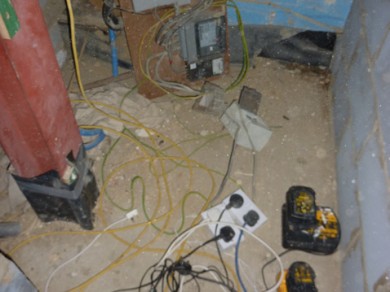
An improvement notice was served here as site management fell below safe standards.
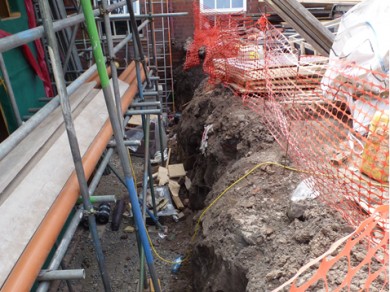
Unsafe excavation work here led to a Prohibition notice.
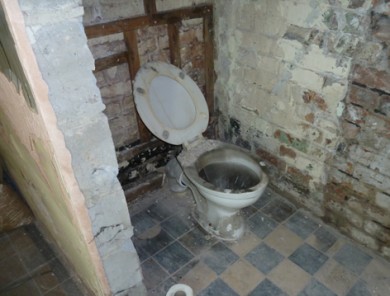
Is this the kind of hygiene facilities you should be finding on a construction site?
----
Are you looking to switch careers and join the construction industry as a carpenter, bricklayer, plasterer, tiler or decorator? Not sure where you can get the qualifications to join this exciting, challenging and rewarding sector? An Access Academies training course could change your life. With the help of our expert teaching staff, you'll work through an intensive construction course that gets you the required qualifications to become a professional tradesman. To find out more, have a look at the courses pages on this website or contact us on 0800 345 7492.
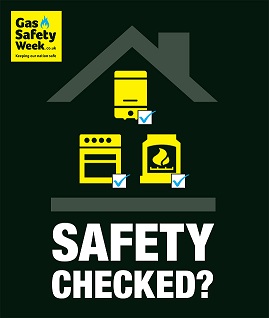
Back in the beginning of August we wrote a post about the forthcoming Gas Safety week, which was set to kick off between the 16th and 22nd of September. Well time has flown since then, and its now only three more days until the week-long awareness campaign gets underway!
Set up by the Gas Safe Register, this week will see all areas of the gas industry - manufacturers, retailers, training companies, consumer bodies and even the public, make a special effort to inform about the importance of proper gas safety and the dangers from not taking proper care. So far of 2500 different people (including Access Training) have pledged their support toward the cause, and there's still plenty of time for you to do the same! Simply visit the website and sign up to pledge your support, and following that you'll be sent a supporter's kit to give you some ideas of what you can do in your area.
What is the Gas Safe Register?
Gas Safe Register is the official list of gas engineers who are qualified to work safely and legally on gas appliances. By law, all gas engineers must be on the Gas Safe Register. It replaced CORGI.
Registering with Gas Safe Register is a legal requirement for anyone carrying out gas work in the United Kingdom, Isle of Man and Guernsey. For more information and to register email register@gassaferegister.co.uk or call 0800 408 5577.
How to find an engineer
To make sure that gas appliances such as boilers, fires, ovens and hobs are fitted, fixed and serviced safely, only a Gas Safe registered engineer should carry out the work. If someone other than a Gas Safe registered engineer undertakes gas work, they are breaking the law and could put lives at risk.
To prove they are legally permitted to work on gas, all Gas Safe registered engineers have an ID card with their own unique licence number and a photograph. Those in the building industry must always check that engineers contracted to undertake gas work are on the Gas Safe Register.
To find or check an engineer go to www.GasSafeRegister.co.uk or call 0800 408 5500.
Access Training will begin a week long look at gas safety in our blogs, and may even throw in a few special offers for all budding gas engineers too. Gas Safety is an extremely important concern to us, and it is not something that should be taken lightly. Download your supporter's kit today and help spread the word of Gas Safety!
Yesterday it was announced that the Welsh Government has issued new procurement guidance to allow public sector bodies to exclude contractors known to be using blacklists from bidding for contracts.
Welsh Finance Minister Jane Hutt said: "The use of blacklists is wholly unacceptable and I fully sympathise with the individuals and their families who have suffered a terrible injustice as a consequence of contractors engaging in this practice.
“Procurement is an important part of the overall policy toolkit of the Welsh Government. Under no circumstances is it acceptable for any business in receipt of public procurement expenditure to use blacklists. I am determined to take action in Wales. I trust that other Governments in the UK will take similar action if they have not already done so."
The ban will supposedly only cover firms found to be still operating blacklists. Contractors involved the construction trade’s infamous blacklist scandal will still be able to bid for Welsh work provided they have apologised publicly.
Andy Richards, secretary for Unite Wales, added: “The Welsh government’s action to rid Wales of the scourge of blacklisting by ensuring that those who practice blacklisting do not benefit from public contracts is to be commended.
We look forward to working with the Welsh government to put this policy into practice and urge other governments across the UK to follow suit in bringing in tougher laws to call time on blacklisting everywhere.”
Via Construction Enquirer
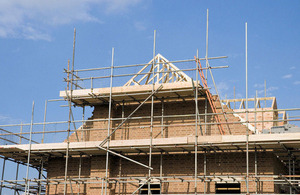
New Government figures from the Department for Communities and Local Government have shown an impressive surge in house building between April and June this year.
The statistics show that during this period there were a total of 29,510 new homes started - 6% highter than the previous quarter, and a third higher than the same time last year. Seasonally adjusted private enterprise completions increased by 11%.
This growth in the construction sector has been attribued to the wide range of government measures currently in play, which have also led to the hightest number of first-time buyers and lowest level of repossessions since 2007. These include;
- New housing supply at its highest level since 2008, with a total 334,000 new homes built in England over the past 3 years
- Over 150,000 new affordable homes built over the past 3 years thanks to the wide range of affordable housing programmes, including £19.5 billion of public and private investment over this Spending Review, and over £22 billion investment in the 3 years after that.
- Interest rates kept low thanks to government action to tackle the deficit inherited from the last administration.
- Over 10,000 reservations for newly-built homes in just the first 4 months of the government’s Help to Buy: Equity Loan scheme.
- The Funding for Lending scheme, which has increased the availability of competitively priced mortgages.
Communities Minister Brandon Lewis said: "Under the last administration, housebuilding fell to its lowest peacetime rate since the 1920s. But today’s figures clearly show government action is bringing confidence back into the housing market and getting Britain building again, with starts increasing by a third year-on-year. We’ve already delivered over 330,000 new homes over the past 3 years, and 150,000 affordable homes. There is more to do, but today’s figures reinforce the momentum towards getting Britain building again."
Of course these houses are going to need a lot of work done of them before they're inhabitable, and this is where you come in. The market is going to need electricians, plumbers, gas engineers, bricklayers, plasterers, carpenters, tilers and decorators - and if you've every considered entering one of the trades, an Access Training course is all you need to do it. We get you the necessary qualifications to enter your chosen trade and start your journey to a career filled with success and variety. To find out more call us on 0800 345 7492 today.
With Gas Safety week coming up soon Access Training will be highlighting the importance of gas safety in our blog in the lead up to 16-22 September. However this isn't always going to be in a fun and educational way - yesterday the Heating, Ventilating & Plumbing magazine reported two separate instances of dishonest traders either fined or leaving people at risk because the tradesmen were not Gas Safe Registered.
The first article reports that a self-employed heating installer from King's Lynn was fined for illegally carrying out sub-standard gas work at two homes in Norfolk. Ryan Neale, trading as R. Neale Plumbing and Heating, installed gas appliances and pipework despite not being Gas Safe registered. He was fined a total of £2,000 and ordered to pay a further £1,000 in costs after pleading guilty to two separate breaches of the Gas Safety (Installation and Use) Regulations 1998 for his work at each property – four charges in total.
Secondly, a London heating installer was also fined for illegal and unsafe gas work. Abhishev Yadav, 28, of Greenwich, installed a boiler at a property on Penywern Road, Earls Court, that was later classed as ‘at risk’ because the flue was not properly sealed or secured. He carried out the work in March 2011 on behalf of his firm Ability Heating, while falsely claiming to be Gas Safe registered. He was was fined a total of £7,500, and ordered to pay £2,500 in costs plus a £120 victim surcharge for breaching the same regulations.
In response to these stories, Gas Safe Register chief executive Russell Kramer has issued this statement: "Every Gas Safe registered engineer has an ID card which shows who they are and the type of work they are qualified to carry out. Customers should ask to see this and check the engineer is qualified to do the job in hand. You can also check your engineer by calling us on 0800 408 5500 or by visiting www.gassaferegister.co.uk.
Joining the Gas Safe Register is a legal requirement of any tradesman installing, maintaining and decommissioning gas appliances and can only be achieved when they have been awarded all of the relevant gas qualifications. The register can also be used by homeowners to search for a suitable tradesman in their area, or to ensure that the one they've hired is a legitimate gas engineer.
If you're interested in earning the qualifications to become a qualified gas engineer, Access Training offer comprehensive gas courses that will have you well on your way to success. Completing our courses successfully will give you the skills and knowledge to join the Gas Safe Register and start a new and rewarding career. To find out more give us a call on 0800 345 7492.
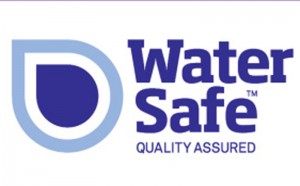
Gas Safe has proved time and time again to be an effective method in separating genuine gas engineers from cowboy traders, so that the general public know that when they hire a tradesman he or she is legitimate. But despite this, this sort of system is currently only available for gas engineers - so Joe Bloggs may not have the same level of certainty when hiring a plumber for wet work.
Until now that is. Or more precisely, October 8th 2013.
WaterSafe has been put together to provide a search facility of all Approved plimbers working in the UK, thanks to a partnership between UK water suppliers and the seven Approved Contractors' Schemes working across the UK. It will promote compliance with the Water Supply Regulations 1999 and Scottish Water Byelaws in order to protect the public and make it even more difficult for unqualified dishonest plumbers to get work. Unlike the Gas Safe register this isn't a legal requirement, but will publically show plumbers are both fully qualified and competent in their trade. So arguably its something that's probably in your best interest to do.
WaterSafe's website isn't open just yet, however it can be found at www.watersafe.org.uk where you can find all the relevant contact details to find out more about the scheme. Keep checking back to this blog, as we're sure to be covering more of this brilliant new scheme closer to its official launch.
In the meantime - if you have any outstanding plumbing qualifications or are looking to become a professional plumber yourself, have you considered a comprehensive plumbing course from Access Training? Our courses are suitable for both newcomers and experienced plumbers alike, so give us a call on 0800 345 7492 or check out the courses section of the site to find out more.
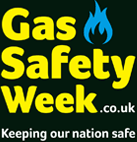
The Gas Safe Register is preparing for its annual Gas Safety week, which is due to take place between the 16th and 22nd of September.
The week is geared to raise awareness of gas safety and the importance of taking care of your gas appliances. While it is co-ordinated by the Register, it is also supported by many areas of the gas industry - including retailers, manufacturers, consumer bodies and the public. They are inviting anyone looking to get involved to pledge their support online via the website, where they will then receive a supporter's kit to help spread the word of gas safety.
Twenty one million households in United Kingdom, Isle of Man and Guernsey use gas for heating, hot water and cooking, yet we take it for granted that our boilers, cookers and gas fires are safe. Badly fitted and poorly serviced gas appliances can cause gas leaks, fires, explosions and carbon monoxide poisoning.
Did you know?
- Every year thousands of people across the UK are diagnosed with carbon monoxide poisoning. It is a highly poisonous gas. You can’t see it, taste it or smell it, but it can kill quickly with no warning. Gas Safe Register estimate that there are a hard core of around 7,500 illegal gas fitters operating across the UK and up to 250,000 illegal gas jobs may be carried out each year (Gas Safe Register Research 2009).
- Although there is awareness that gas appliances need to be safety checked annually, 43% of Britons don’t do it, and 10% have gas appliances which have never been checked (Gas Safety Week Research 2011).
Access Training have already pledged their support to Gas Safety week, so look forward to more articles and tweets from us about it in the run up to September!
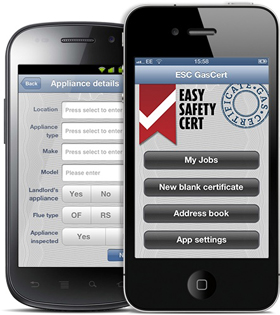
Easy Safety Cert are offering registered Gas Safe engineers a free trial of their gas safety inspection software, available as an app for iOS devices such as an iPad or iPhone, with an Android version due to launch within the next six weeks.
Engineers will be able to complete, send and store gas safety inspections while on the go. They will also be access their own secure online database, which stores completed certificates along with client and job details and automatically sets 12-month inspection reminders.
The trial allows three free inspections; beyond that, engineers can purchase inspections on a pay-as-you-go basis. There are no subscription fees or extra charges for multiple users, devices, support or updates.
Bianca Dainty, director of Easy Safety Cert, said: "We’ve always had a key focus on usability and quality. The new features found in the iPad and updated iPhone apps are examples of our commitment to bringing the best technology to our customers."
The app can be found by searching "ESC GasCert" in the App store.
The Construction Industry Scaffolders Record (CISRS) have announced the introduction of a new, mandatory training scheme for all new entrants to the industry, taking effect from September 1st 2013.
This one day course must be taken before a card will be issues, and will cover;
- Relevant regulations and codes of practice
- General responsibilities
- Basic scaffold terminology (components & application)
- Servicing of equipment, tube, fittings etc.
- Boards & stock – quality control
- Health, welfare, hygiene & housekeeping
- Electrical safety
- Fire prevention & control
- Noise & vibration
- Work at height
- Accident prevention & reporting
- Personal protective equipment
- Site transport safety (including loading & unloading)
- Equipment & tools
- Manual handling (Including a practical element)
- Lifting equipment using a rope & wheel
- Questions/test paper.
They will also be required to pass a CITB health, safety and environment test (or possess a recognised exception). Applicants are advised to apply for their card withing two years of their test date or it will expire.
CISRS scaffolding labourers will need to repeat this course every five years to renew their card. Existing cardholders will also be required to complete the course when their current card expires as part of a new CISRS scaffolding labourer refresher training scheme.
Via The Construction Index